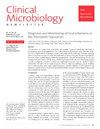蜱虫谈话:波瓦桑病毒、心脏地带病毒和波旁病毒
Q3 Medicine
引用次数: 1
摘要
最近出现的可能引起严重疾病的新的蜱传病毒令人震惊。在鉴别诊断中考虑这些病原体时,必须了解这些病毒的性质、传播媒介和地理分布以及相关感染的临床表现。目前,有限的监测和不充分的诊断方法限制了对新出现的蜱传病毒传播的全面了解。本文重点介绍了三种新出现的蜱传病毒;波瓦桑,哈特兰和波旁。本文章由计算机程序翻译,如有差异,请以英文原文为准。
Tick Talk: Powassan, Heartland, and Bourbon Viruses
The recent emergence of additional novel tick-borne viruses with the potential to cause severe disease is alarming. An awareness of the nature of these viruses, their transmitting vectors and geographical distribution, and the clinical presentations of associated infections is essential when considering these pathogens in the differential diagnoses. Currently, limited surveillance and inadequate diagnostic approaches limit a complete understanding of the spread of emerging tick-borne viruses. This article focuses on three emerging tick-borne viruses; Powassan, Heartland, and Bourbon.
求助全文
通过发布文献求助,成功后即可免费获取论文全文。
去求助
来源期刊

Clinical Microbiology Newsletter
Medicine-Infectious Diseases
CiteScore
2.20
自引率
0.00%
发文量
35
审稿时长
53 days
期刊介绍:
Highly respected for its ability to keep pace with advances in this fast moving field, Clinical Microbiology Newsletter has quickly become a “benchmark” for anyone in the lab. Twice a month the newsletter reports on changes that affect your work, ranging from articles on new diagnostic techniques, to surveys of how readers handle blood cultures, to editorials questioning common procedures and suggesting new ones.
 求助内容:
求助内容: 应助结果提醒方式:
应助结果提醒方式:


